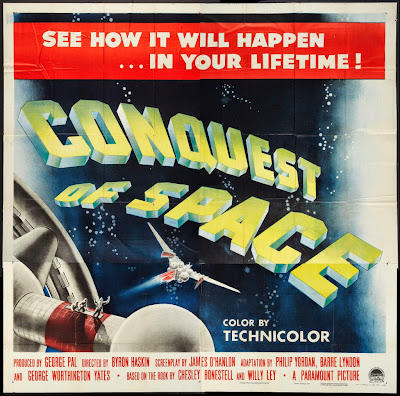
Ambitious, serious action-packed sci-fi adventure
Directed by Byron Haskin
Produced by George Pal
Screenplay by James O'Hanlon
Music by Nathan Van Cleave
Editing by Everett Douglas
Distributed by Paramount Pictures
Running time: 81 min.
Box office: $1 million (US)
Cast
Walter Brooke: Gen. Samuel T. Merritt
Eric Fleming: Capt. Barney Merritt
Mickey Shaughnessy: Sgt. Mahoney
Phil Foster: Jackie Siegle
William Redfield: Roy Cooper
William Hopper: Dr. George Fenton
Benson Fong: Imoto
Ross Martin: Andre Fodor
Vito Scotti: Sanella
John Dennis: Donkersgoed
Michael Fox: Elsbach
Joan Shawlee: Rosie McCann
Iphigenie Castiglioni: Mrs. Heinz Fodor
Trailer
(This post contains spoilers)

The Wheel

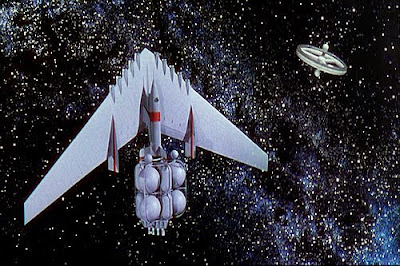
On the rocket being constructed, Roy Cooper confides that he is afraid of going to the moon but he is also “afraid of being left behind.” Sgt Jackie Siegle asks, “Who’s gonna guarantee we’ll ever get back?” Suddenly an accident occurs when Roy Cooper becomes paralysed while working with high tension cabling. After he is taken back to “The Wheel” and checked out by the doctor, it is determined that he is suffering from “somatic dysphasia” or “space fatigue,” and needs to be returned to Earth. The doctor points out that “man has never before lived in space” while Roy tells his crewmates, “you fellas know how tough it’s (crew selection process) been.”
Living and working in space and exploring space is, has always been and will always be a dangerous endeavour. A thin barrier of technology is all that separates existence from oblivion. People will continue to die in space despite all of the precautions we take. What effect would such an unnatural and alien manner of existence have on the human psyche as days stretch into weeks and then into months and potentially into years? How tough and rigorous must the training be to prepare people to deal with such stresses?
The six crewmen who made it through the selection process go to the mess hall. Immediately their unique status is apparent as everyone else stands to attention until Sgt Mahoney and his “six little lambs” take their places at their own table. Their meal consists of a special diet of various flavoured tablets and water: “all the nourishment you need, no waste.”

The provision of sufficient food and water for long duration space flights and planetary missions may prove to be a logistical nightmare until recycling and methods of achieving self-sufficiency have been perfected. At least obtaining nourishment for astronauts has come a long way from notions of diets consisting solely of pills or bland slop sucked from tubes!
The dangerous environment of space is suddenly and shockingly made apparent when the wheel is struck by meteors with the concussive force of Thor’s hammer. In an unnerving scene, the men in the mess hall are hurled and sprawled all over tables and end up wearing the contents of their dinners. Under Col / Gen Merritt’s direction the wheel is eventually stabilized and damage control crews manage to seal the hull leaks.
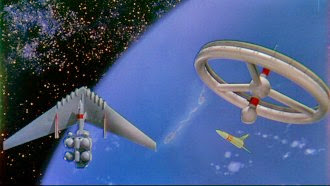
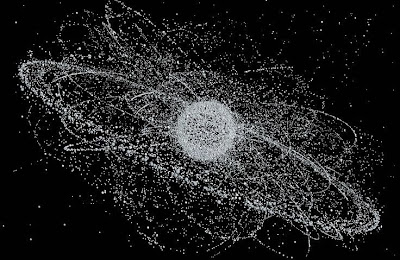
Every bit of space junk orbiting the Earth!

A cargo rocket arrives and transfers Dr George Fenton who has some critical news for Col / Gen Merritt and adds a complicating factor to the story. Juxtaposed to this is the apparent emotional and mental unravelling of Merritt. In an ironic response to Dr George Fenton’s query, he states that he is as “fit as a fiddle.” We have already had lingering shots of Merritt in his quarters undergoing some kind of inner turmoil; almost losing his balance on his way to his quarters; displaying almost Captain Queeg-like utterances when severely reprimanding members of his crew: “One second can be the difference between life and death!” and chastising those who talk about food when there are those on board who can’t share their diet. We know that Merritt is not a well man.
Merritt questions the construction and purpose of the space craft being assembled. It has been brought into space and assembled piece by piece as part of an international combined effort. He is under the impression that the ship is destined to go to the Moon, but can’t understand why it has wings.
Fenton soon informs Merritt via a letter from the Supreme International Space Authority that the true destination of the ship is in fact Mars. The newly promoted general Merritt almost blows a gasket over this new development as he has all along been preparing to go to the Moon as a test run of the ship’s systems. “No word, no warning; just take off and leave!” Although he considers the mission to be “stupid and callous” he accepts the command and his son also requests his transfer be stopped as he too wants to go on the mission to Mars with his father. Along with Merritt and his son, the crew after the calling for volunteers will consist of Siegle, Imoto and Andre Fodor, each possessing a necessary speciality.
Unlike film fiction where destinations in space can be changed on a whim, real-life missions take years of meticulous planning. We have, however moved a long way from selecting crews based solely on fly boys and test pilots possessing the right stuff. From the days of Gemini and Apollo, emphasis has been placed on crew members being mission specialists, (geologists, physicists, etc.,) We have also witnessed many examples of international cooperation in space since the 1970s culminating in the construction of the ISS and various joint missions to it. The space station itself was brought into space and assembled module by module over time.
Merritt questions the construction and purpose of the space craft being assembled. It has been brought into space and assembled piece by piece as part of an international combined effort. He is under the impression that the ship is destined to go to the Moon, but can’t understand why it has wings.
Fenton soon informs Merritt via a letter from the Supreme International Space Authority that the true destination of the ship is in fact Mars. The newly promoted general Merritt almost blows a gasket over this new development as he has all along been preparing to go to the Moon as a test run of the ship’s systems. “No word, no warning; just take off and leave!” Although he considers the mission to be “stupid and callous” he accepts the command and his son also requests his transfer be stopped as he too wants to go on the mission to Mars with his father. Along with Merritt and his son, the crew after the calling for volunteers will consist of Siegle, Imoto and Andre Fodor, each possessing a necessary speciality.
Unlike film fiction where destinations in space can be changed on a whim, real-life missions take years of meticulous planning. We have, however moved a long way from selecting crews based solely on fly boys and test pilots possessing the right stuff. From the days of Gemini and Apollo, emphasis has been placed on crew members being mission specialists, (geologists, physicists, etc.,) We have also witnessed many examples of international cooperation in space since the 1970s culminating in the construction of the ISS and various joint missions to it. The space station itself was brought into space and assembled module by module over time.
Although criticism has been made about such sentiments being little more than a apologetic justification for Japan’s aggression during the Second World War, there is an important element of truth in the character Imoto’s words.
Human conflict and warfare can never be seen in simple superficial black and white, good vs bad or right and wrong terms. The reasons for and causes of conflict are often complex and multifaceted. The actions of Nazi Germany, Imperial Japan and a host of military acts of aggression since cannot be condoned or justified. However, a combination of political, social and economic elements can come together to impel a nation’s people to adopt a violent course of action in order to seek redress and find a solution to perceived problems and threats to its survival.
Could a similar planet-wide catastrophe threatening the very survival of the human species be extrapolated from such a scenario? Imoto thinks so and for him missions like the one he has volunteered to take part in offers the best chance of guaranteeing humanity’s long-term survival.

Merritt’s long time friend Sgt Mahoney volunteers to go on the mission but he is rejected on the grounds of being too old. Helping an old friend or the usual case of ageism? Later on in a recreation lounge, the crew watch a tv broadcast from Trans World Communication on Earth when suddenly a special bulletin interrupts the crew’s entertainment to announce the official launch of the ship to Mars. This is then followed by a heart-rending private message from Fodor’s mother and an amusing one from Sgt Seigle’s “two-timin’ tomata’” of a girlfriend, Rosie
Spaceship 1: Mission To Mars
You would think that Mahoney’s stowing away aboard the ship just might call into question mission security procedures, not to mention throwing the presumed pre-calculated weight to fuel ratios necessary for the mission’s success completely out of whack!
During the course of the voyage, Gen Merritt is in evident anguish over his doubts about man’s role and presence in space. For him man’s every move is recorded in the bible, “except for this one.” He questions whether we are “explorers or invaders” and concludes that they are committing “an act of blasphemy” by their very presence in “the sacred domain of God.” By comparison, even a certain Captain Queeg from Caine Mutiny fame would come across as being sane and rational!
Merritt’s son in his discussion with his father suggests that with the Earth’s diminishing resources, the timing was too perfect to be accidental and that the “universe was put here for man to conquer.” And this argument is supposed to help placate someone who is emotionally, spiritually and mentally unbalanced!
Would humanity’s presence in space and colonisation of planets constitute an act of exploration or invasion? In Merritts’ mangled mental and spiritually suffering condition there can only be one answer. However, life is never that black and white. It depends from whose or what point of view you’re seeing things. Our very presence in space and on other planets, along with our interactions with such alien environments would cause them to be affected and altered even in the minutest sense, no matter what our intentions may be.
What if we come across some form of life whether it be deemed by us to be intelligent or not? If “intelligent,” they may have a definite point of view about our presence in their domain. Also the sheer immensity of space itself makes the idea of the universe being entirely at humanity’s disposal laughable. We are after all located on a pimple on the end of the bum at the arse-end of the universe!



General Merritt eventually decides to go outside the ship and conduct a space burial for Fodor. The passage he has selected seems to be from Psalm 38;
“{A Psalm of David, to bring to remembrance.} O LORD, rebuke me not in thy wrath: neither chasten me in thy hot displeasure. For thine arrows stick fast in me, and thy hand presseth me sore. There is no soundness in my flesh because of thine anger; neither is there any rest in my bones because of my sin. For mine iniquities are gone over mine head: as an heavy burden they are too heavy for me. My wounds stink and are corrupt because of my foolishness. I am troubled; I am bowed down greatly; I go mourning all the day long. For my loins are filled with a loathsome disease: and there is no soundness in my flesh. I am feeble and sore broken: I have roared by reason of the disquietness of my heart …………..For I am ready to halt, and my sorrow is continually before me. For I will declare mine iniquity; I will be sorry for my sin………..Forsake me not, O LORD: O my God, be not far from me. Make haste to help me, O Lord my salvation.”
Merritt in his anguished mental state has hit upon a passage from the bible that for him seems to reflect the kind of grief he feels and how he believes that his own sins are the cause of what he is going through and which has provoked God to act against him and his crew for daring to do what they have done. He has now confessed his sins against God and asks for His help to save him.
As the voyage progresses General Merritt’s mental and emotional state further unravels. As he watches the planet Mars loom closer, he declares it to be both “the planet and the blasphemy.” During a routine report to Earth he rants about their mission being either to “Mars or hell.” He even declares that he would blow the ship up rather than complete the mission.
It is a wonder how at this stage the General’s condition can be reported as being the product of suffering very bad headaches and lack of sleep. Worse still, he is left in command of the mission! To make matters worse, Mahoney makes the ominous observation that as they near Mars the planet appears to be “all red-faced and pouting, like she’s angry with us.”
Mars







In the face of such a bleak prospect and during the act of burying General Merritt, Imoto plants a single seed in the Martian soil. This symbolic act highlights the prospect that out of the ashes of despair and death, hope and life can find a way to grow and flourish.
After months slowly pass by the crew celebrates Christmas on Mars. However, their morale is very low due to a lack of water and no contact with Earth, besides having to put up with Siegle’s annoying presence for so long! Mahoney now begins to believe the General was right all along and that they are all cursed. Just as Siegle declares that “only God can make a tree” and asks, “Where’s the water?” a snowstorm suddenly blows-up thereby solving the water supply problem.
When July arrives, it is time for the crew to make preparations for their departure. With the approach of their launch window, the seed Imoto had earlier planted sprouts into a tiny flower proving that life is possible and that Mars can be agriculturally productive.
A Marsquake suddenly rocks the landing site, throwing their launch plans into jeopardy. The ship which is now tilted at the wrong angle, needs to be straightened. Barney comes up with a plan to fire the engines in order to shift the sand from under the ship and have it oriented correctly. At the last minute before take off the plan succeeds and the ship gradually rises from the Martian surface.

Homeward Bound
Points Of Interest
Production & Background
Director, Byron Haskin was involved with other sci fi film classics that have been and will be featured in this blog. He worked with George Pal on The War of the Worlds (1953) and there was his work on From the Earth to the Moon (1958) and Robinson Crusoe on Mars (1964).
The film Conquest of Space is based on a 1949 non-fiction book of the same title illustrated by Chesley Bonestell and written by German Rocket Society member Willy Ley. Bonestell known for his photo-realistic paintings of outer space vistas, worked on the space matte paintings used in the film. Material from Wernher von Braun's 1952 book The Mars Project was also incorporated in the making of the film.
Originally George Pal had the idea of making a movie involving a trilogy of stories featuring a giant revolving space station in orbit around the Earth from which missions to the planets Venus, Mars and Jupiter would be launched. Paramount studios wasn’t keen on the idea of a lengthy space epic, which was deemed to be too expensive. What we were eventually left with was a scaled-down version involving only the one mission to Mars, together with a complicated father-son relationship and the mission commander suffering a mental and emotional breakdown as well as religious / spiritual delusions and jeopardizing the mission with acts of sabotage.
Special Effects & Music


Realistic Portrayal
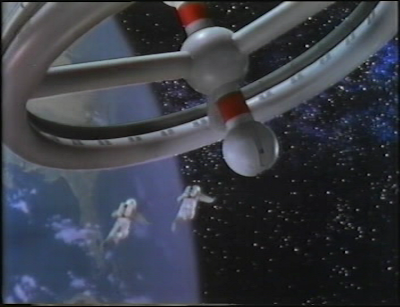
Detracting Features

Conclusion
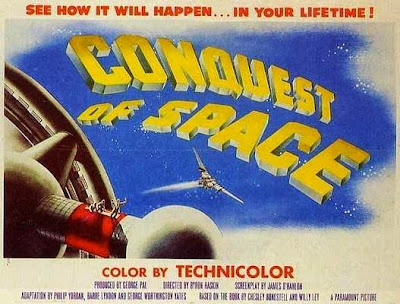
©Chris Christopoulos 2014

No comments:
Post a Comment